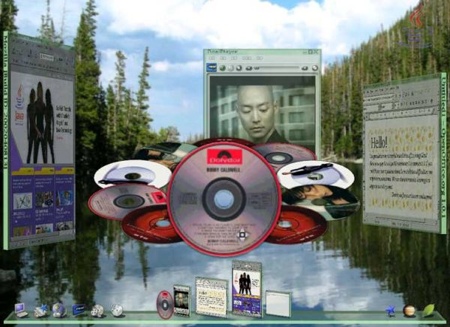There was a posting on the Linux forums that caught my attention mainly because its title and subsequent logic was so twisted that it was hard to ignore. Why Ubuntu Got It All Wrong is a fairly lengthy posting about how Ubuntu Linux, arguably the most successful Linux of the last few years, is completely wrong and should be viewed as a dismal failure. It is an interesting concept, Ubuntu is certainly showing signs of being too popular too fast, but the logic behind the argument is wrong. The weirdest statement made is that a 'revolutionary' Linux desktop should not resemble the current desktop (i.e. Windows/OSX) at all. In fact in the eyes of the author Ubuntu seems to fail because it is too conventional and the money invested by Mark Shuttleworth would have been better spent on experimental, never to be seriously adopted concepts like Project Looking Glass.

A screenshot from Project Looking Glass
Ubuntu and most Linux desktops are not about 'revolutionising' the desktop experience if there is such a thing. The key ideology behind Ubuntu and to a lesser extent Red Hat/Suse is to bring an open-source desktop alternative to the Microsoft dominated table. With this objective in mind Ubuntu is doing an excellent job, the operating system installs on just about anything, it is relatively stable and what's more the end result can be used by normal people as long as they are semi-computer literate. This ease of use is the key behind Ubuntu and if the desktop experience was as 'revolutionary' as this poster is suggesting then my guess is the end result would be interesting from an academic perspective but hardly practical.
What's more the poster contradicts himself by first stating the desktop experience is not revolutionary enough and then goes on to say "human beings don't like change and cannot be expected to change every piece of software they all use at once". I am afraid you can't have one without the other and once you start running applications like Photoshop through Wine any hope of a revolutionary desktop is lost in the flat-tone grey that is Windows GUI emulation in Linux.
It is a shame the post is so riddled with these contradictions, the underlying premise seems to hold merit and there is the odd valid point made. Like for example why haven't large companies invested serious effort (in developer and support time) on Wine? It would appear Wine is a very promising technology from the perspective that it can get essential business applications running native in Linux. Google has provided some patches in order to ensure Picasa compatibility but that is at the low-key end of support. Unfortunately whilst Wine is kept out in the relative cold by Ubuntu, Red Hat, Novell and others it will never reach its full potential, and whilst this remains the case I am affraid neither will desktop Linux.
